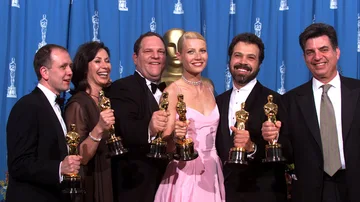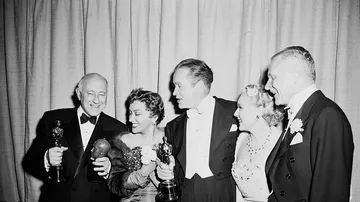The tastes of the Academy of Sciences and Cinematographic Arts of the United States They are inscrutable. Only one can explain that some of the biggest films in history, such as ‘Citizen Kane’, ‘The Third Man’ or ‘Pulp Fiction’ (for just citing three), they will run out of their Oscar Award for Best Film in favor of notable (but lower) feature films such as ‘What green was my valley’, ‘Eva al nude’ or ‘Forrest Gump’.
However, these are not the most flagrant examples of mediocre tapes that, without reaching the category of Bodriosthey rose with the statuette when there were other better. With the ceremony of the [[LINK:TAG|||tag|||5f526624a03f7f12cedbd3d5|||Premios Oscars 2025]] On the back of the corner, we gather those that, from our humble opinion, are The 10 worst (or most unfair) winning the maximum award granted by the film industry.
The 10 ‘worse’ movies that won an Oscar
‘Crash’ (2004), by Paul Haggis
Crash He got, to the surprise of the staff (there is nothing more to see Jack Nicholson’s face reading the envelope), Watch out for the Oscar for Best Film Before competitors as powerful as ‘Munich’from Spielberg, or ‘Brokeback Mountain’ of Ang Lee.
Paul Haggisreputed screenwriter, knew how to combine without blush The ingredients like the Academy so muchsee cross stories, dramas in the purest American style, and such Oscarizable Like racism, religion or politics In a story about the redemption full of known faces that came out of their comfort zone.
The interpreters did what they could with this film, pure emotional manipulation worthy of a desktop melodrama, where Haggis (who has admitted that he did not deserve the prize) He demonstrated his zero boards after the camera with a flat and soulless direction. 16 years later, few remember her.
‘Shakespeare in Love’ (1998), by John Madden
{“@context”: “https://schema.org”, “@type”: “Imageobject”, “URL”: “”, “Uploaddate”: “2025-02-25t17: 19: 05.056+01: 00”, “Width”: “1000”, “Height”: “567”

Gwyneth Paltrow with Harvey Weinstein and other producers of the movie ‘Shakespeare in Love’ celebrate their Oscar prize for best film in 1999. | Getty
Not even the same William Shakespeare I would be able to give credit to a story where ‘Shakespeare in Love’neat but routine and harmless romantic tragicomedy Directed by John Maddenhe raised with the Oscar above two war classics as ‘Save soldier Ryan’ either ‘The thin red line’.
However, this happened in the year 1998when the infamous Harvey Weinsteinat the summit of his power in [[LINK:TAG|||tag|||5f525010a03f7f12ceda074f|||Hollywood]]he managed to scratch until seven statuettes For this forgettable production where a young bard (Joseph Fiennes) in search of inspiration ended up finding it, as expected, in a woman (Gwyneth Paltrow) with the occasional secret.
‘The biggest show in the world’ (1952), by Cecil B. Demille
{“@context”: “https://schema.org”, “@type”: “Imageobject”, “URL”: “”, “Uploaddate”: “2025-02-26t14: 20: 38.832+01: 00”, “Width”: “1000”, “Height”: “567”

Cecil B. Demille holds the statuette of his Oscar prize for best film for ‘The biggest show in the world’ in 1953. | Getty
The thing about injustices at the Oscar Awards It is something that has occurred from almost the beginning of its existence. You still remember what happened in 1953when ‘The biggest show in the world’ He won the precious statuette and won classics as ‘The quiet man’ or ‘only in the face of danger’ (‘Singing in the rain’ was not even nominated).
No one can discuss Cecil B. Demille its importance as one of the greats of the American industry, but we must also recognize that this decaffeinated family drama (with love triangle) set in the circus world was not his brightest film.
‘The return to the world in 80 days’ (1956), by Michael Anderson and John Farrow
{“@context”: “https://schema.org”, “@type”: “Imageobject”, “URL”: “”, “Uploaddate”: “2025-02-26t14: 32: 14.792+01: 00”, “Width”: “1000”, “Height”: “567”

Cantinflas, David Niven and the rest of the actors during a scene of ‘The return to the world in 80 days’ in 1956. | United Artists/Getty Images
In 1957, Cecil B. Demille He received from his own medicine when he saw how ‘Around the world in 80 days’family entertainment starring David Niven and Mario Moreno ‘Cantinflas’the statuette was carried in front of ‘the ten commandments’.
It costs to find an explanation (which does not imply the bribe) what it led to the Academy to reward this adventure tape in a year in which it also competed ‘Giant’ and where ‘The Seven Samurais’, by Akira KurosawaHe was not even nominated.
Maybe the fact that 40 of the most influential stars in Hollywood (From Marlene Dietrich to Buster Keaton or Frank Sinatra) They made a cameo In this tape that, everything must be said, had a Impeclable Production Design.
‘The Artist’ (2011), by Michel Hajanavicius
{“@context”: “https://schema.org”, “@type”: “Imageobject”, “URL”: “”, “Uploaddate”: “2025-02-26t14: 45: 52.012+01: 00”, “Width”: “1000”, “Height”: “567” 567 ”

The cast of ‘The Artist’ poses with his Oscar prize for best film in 2012. | Getty/Corbis
Nostalgia is a powerful weapon. If not, it is difficult to find a logical explanation of How ‘The Artist’ got the Oscar for Best Film.
The tape of Michel Hazanavicius It became one of the great surprises of the history of these awards, more for the risky of the proposal (French film, mute and in black and white), than for the quality of its competitors (‘War Horse’, ‘Midnight in Paris’ or ‘The Tree of Life’ are good films, but not masterpieces). The Academyalways sensitive to film stories inside the cinema, he surrendered to memory of past times And he ignored the many deficiencies of a charming feature film, but inconsequential.
‘Birdman or (the unexpected virtue of ignorance)’ (2014), by Alejandro G. Iñárritu
There is nothing to like an academic of [[LINK:TAG|||tag|||5f525010a03f7f12ceda074f|||Hollywood]] that a story of redemption where the protagonist (and who interprets it) is An actor at low hours about to leave the hole.
If we add a revolutionary point of view and a technical achievement to this, the statuette is practically assured, regardless of whether the argument is more or less consistent or if the camera movements invite to change popcorn for biodramins. ‘Boyhood’ (That if we talk about cinematographic milest Best actor for Michael Keaton. And he didn’t take it.
‘Walking to Miss Daisy’ (1989), by Bruce Beresford
Impossible to discuss the charm of this Adaptation of Alfred Uhry’s theatrical work starring a retired moody (Jessica Tandy) and its new black driver (Morgan Freeman), but it costs more to defend this Dramedia Obvia Moraleja will rise with the Oscar for Best Film above jewelry like ‘The Dead Poets Club’, ‘Born on July 4’ or ‘My Left Foot’.
Although it addresses a topic as thorny as the racial issue in Southern Americathe impersonal address of Bruce Beresford He subtracted a movie whose good feelings (and the complete absence of sex or violence) captivated academic conservatives. Rewarding cinematographic quality would remain for another year.
‘A wonderful mind’ (2001), by Ron Howard
With ‘A wonderful mind’, Ron Howard He signed what would be the final testament of his way of watching cinema, an impeccable viewing film and production design, solid interpretations and a little disguised tendency to the emotional manipulation of the spectator.
On this occasion, the biopic of John Nashthat while trying to sit at the world of mathematics he had to fight with schizophrenia, he not only got touch the public fiber of the publicalso that of the academics, who forgot that it was a foreseeable tape, of narrative codes close to obsolescence, and that he sweetened a terrible mental illness and gave him the Oscar for which he was designed.
It was the most Oscarizable Of the nominees (the remarkable ‘Gosford Park’, the first installment of ‘The Lord of the Rings’ and the ‘Moulin Rouge’ video clipe, among them) and that was what led her to success.
‘Chicago’ (2002), by Rob Marshall
Would give for a program of Research team The case of the Oscars 2003when movies like ‘Gangs of New York’, ‘The pianist’ (by Roman Polanski) or ‘Las Hours’ saw from the armchair of seats how ‘Chicago’ collected the golden eunuch for best film.
Too much prize for Rob Marshall’s feature film, full of spectacular choreographies (when César is from Caesar), but whose dramatic ground did not give even for one of the choruses. They were the 2000s, it seems that the academy had a monkey to reward a musical (the last one had been ‘Oliver’, which we will talk about later) and decided on this luxurious, but empty, adaptation of the Broadway classic.
‘Oliver!’ (1968), by Carol Reed
The 60s had been those of ‘West Side Story’, ‘Smiles and tears’ or ‘My Fair Lady’authentic masterpieces of the musical who made this decade possibly the best for gender. To them He joined ‘Oliver!’, Carol Reed tape that reformulated, based on songs and choreographies, the classic of Charles Dickens.
Without being a bad movie, He failed to move on to posterity As its contemporaries, perhaps because of its inability to find the perfect balance between the family show and the hard background of the original material. In addition, in a year where ‘2001: Odyssey in space’ and ‘The seed of the devil’ They were not even nominated, the prize should have been deserted.
Source: Lasexta
Bruce is a talented author and journalist with a passion for entertainment . He currently works as a writer at the 247 News Agency, where he has established himself as a respected voice in the industry.











